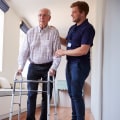Essentially, as long as the 80-year-old has access to help and socialization and can attend to their own needs, they can live alone. However, they should not always be alone. Your children or other family members should check in several times a week to determine if they can still live on their own with Home Care in Little Mountain SC. Dirt, grime, trash, clutter, and dirty clothes should be warning signs that your loved one is having a hard time living Alone with Home Care in Little Mountain SC. They may need an extra pair of hands around the house to handle tasks that have become overwhelming, exhausting, or ignored due to illness. Essentially, as long as the 80-year-old has access to help and socialization and can attend to their own needs, they can live alone. However, they should not always be alone. Your children or other family members should check in several times a week to determine if they can still live on their own with Home Care in Little Mountain SC. Dirt, grime, trash, clutter, and dirty clothes should be warning signs that your loved one is having a hard time living Alone with Home Care in Little Mountain SC. They may need an extra pair of hands around the house to handle tasks that have become overwhelming, exhausting, or ignored due to illness.
When asked, around 90% of the elderly will say that they don't want to go to any type of home as they age. Whether living alone is problematic or a sign of a health problem, then a caregiver can help provide them with a break during the night. Older people who should no longer live alone are prone to not being able to cook enough, either due to tiredness, physical difficulties or problems such as Alzheimer's. The concept of growing old at home may be a fantasy based on the belief that nothing will change to make it necessary to move out of the elderly's home.
Older people may struggle to live alone for a wide variety of reasons, from physical limitations to dementia. While some older people can live at home for long periods of time, not all of them can, and it's normal for older adults to need extra care. If your aging parents used to socialize with friends and family regularly and have recently stopped doing these activities, they may be suffering from a physical or mental illness. When a person who has lived alone must consider other options, moving can be difficult for everyone.
If your older loved one tripped or fell while living alone, don't wait to find out what will happen next. When an older person overheats, they may feel excessive heat due to medications, thyroid problems, dehydration, decreased blood circulation, or hormonal changes. Finally, as parents age, they may become defensive or paranoid about others and even about the news, which could indicate the end of their ability to maintain their current lifestyle. If you've noticed that your parents don't have proper hygiene, they may not have the energy to shower or may be afraid of falling in the bathroom.
This is a 24-hour care option for older parents who require medical and personal care 24 hours a day, seven days a week. Elderly parents who are unable to meet their basic needs, such as cleaning, cooking, bathing, walking, or taking their medications at the right time, should move to an assisted living facility.










